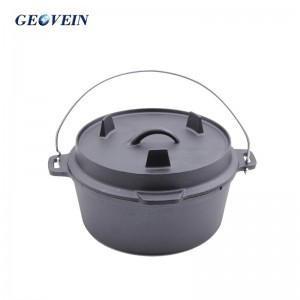1. Season Beforehand
A tough, seasoned cast iron pan will make your food taste better and your cleanup easier. It takes time to season a cast iron pan, so it’s best to do it before you need it. Pre-seasoning also helps prevent rusting since the seasoning acts as an insulator between the metal and oxygen in the air. Just toss your new (unwashed) pan into the oven at 350 degrees for about 30 minutes or until perfectly heated through. Wipe out any excess oil while still hot with paper towels – just don’t use soap! Coat lightly with cooking spray, wipe off excess and let cool completely before storing.
2. Clean Immediately After Use
If you wait too long to clean your cast iron pan, chances are good that it’s going to rust. Condensation and other residual liquids from cooking can cause a build-up of acids on the surface which in turn accelerate oxidation (rusting). To prevent rusting, be sure to immediately wash out your cast iron with warm water and dish soap while still hot. Dry thoroughly and coat lightly with oil while still warm before storage. You don’t have to worry so much about scrubbing or rinsing cast iron because the porous metal will absorb any excess liquid like a sponge – just don’t use soap!
3. Avoid Searing
Searing meat in a cast-iron skillet often leads to the surface of the pan developing an unwanted brown crust. This is because most meats contain proteins and sugar that oxidize when heated, creating a dark non-stick film on the bottom of your pan. Since this “crust” is unsightly, try using heavy-duty stainless steel pans for searing or removing the pan from the heat before food has finished cooking. You can also cook over medium heat but make sure you avoid moving your food around too much as that will result in uneven browning. For extra safety, line your pan with aluminum foil especially useful if you’re going to be deglazing it (see below).
4. Season, Deglaze, and Re-season
If you make a pan sauce or are cooking with wine, deglazing a cast iron skillet is the way to go. You can “deglaze” by simply adding some water and scraping all of that browned goodness – called fond – off the bottom of your pan onto whatever you’re making (such as our BACCHANALIAN BURGER). Once your food is cooked, just pour in some liquid (wine or stock) into your pan along with any herbs and seasonings and cook until reduced by half. At this point, turn on the broiler for 5 minutes to burn off any excess oil left behind from using too much seasoning. If it’s not making your entire kitchen smell like a French restaurant, you know you’re doing it right!
5. Never, Ever Put Your Cast Iron in the Dishwasher
For starters, every dishwasher is different. Just because your best friend’s mother-in-law doesn’t have any problems with her dishwasher doesn’t mean you won’t either. For another: Water – no matter how hot – cannot get as hot as the oven and might not effectively clean off all of that food caked onto your cast iron pan. And for yet another: Even if you use soap, it’ll leave behind a nasty film that will prevent the pan from being able to “breathe” and season properly. You might even bend or warp (permanently) your pan if you put it in the dishwasher! Unless you’re going to be using your cast iron primarily for decoration purposes, leave it out of the dishwasher.
6. Store With Oil (Or Else!)
Last but not least: Never store a cast iron without first coating it with oil or storing it upright so that any condensation drips off. Otherwise, you’ll be left with an unsightly and unseasoned pan. Your only other option is to stick your cast iron in a plastic bag or airtight container before storage. While this does prevent rusting, it also prevents air from getting to the metal — which means no seasoning until next time either. If you don’t want to use oils that have a strong flavor or odor, try drying your cast iron thoroughly (after washing) and using a thin layer of vegetable oil or WUSTHOF WAX CUTING BOARD OIL to coat the surface.






























